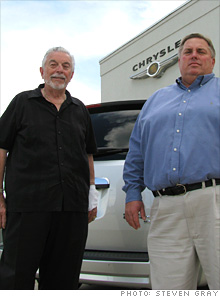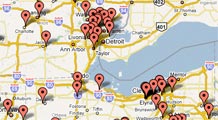Chrysler dealer: 'They're making it impossible'
A New Orleans dealership survives Hurricane Katrina's worst, only to be done in by a manmade crisis.
 |
| Mike Comiskey, owner of Orleans Dodge Chrysler Jeep (L) and Joe Dyke, fleet manager |
NEW ORLEANS (Fortune) -- When Hurricane Katrina hit here in August 2005, it didn't look like Mike Comiskey's Dodge, Chrysler, and Jeep dealership could survive the storm. He'd rallied a group of investors to buy it only five months earlier, but the New Orleans East neighborhood where it stood was among the hardest hit by the post-Katrina floodwater. Comiskey's dealership took on about five feet, and dozens of cars were destroyed.
But determined to be among the first in the area to reopen his business, Comiskey returned quickly. The dealership's fleet manager bought a trailer to manage the dealership's operations and house workers who'd lost their own homes. For more than a year, there was spotty electricity, so Comiskey and his team worked off gas-powered generators. He spent millions buying and hauling cars and trucks from Georgia, Wisconsin, and elsewhere in time to reopen the dealership by October 2005.
And it worked. Mike Comiskey weathered Katrina - and last year's Gustav - but now it may be the Great Auto Industry Bailout of 2009 that finally ends his streak. Last week, Comiskey, 51, learned his dealership is among the nearly 800 with which Chrysler plans to sever ties in the coming weeks. "This was the great American dream," he said last Friday afternoon, scanning his bare blue office overlooking an almost equally bare showroom. "Now, it's an American nightmare."
And it's one that reaches far beyond Comiskey. Last week opened the latest chapter in the American auto industry's implosion: In addition to Chrysler's decision to cut nearly one-quarter of its roughly 3,200 dealerships in the United States, General Motors (GM, Fortune 500) indicated it will end relationships with more than 1,000 dealerships, beginning its march toward some 2,600 dealer cuts through 2010. The developments will likely mean the loss of more than 100,000 jobs, a sharp reduction in car-repair venues and, eventually, the dumping of large tracts of land onto an already bloated real estate market.
Experts pinpoint the start of the problem to the years following World War II, when American automakers rushed to saturate cities and suburbs with car dealerships, in part to thwart the emergence of German and Japanese competitors. A reduction was bound to happen at some point, but much of Chrysler's decision in particular is attributable to its need to comply with the sharp cost-cutting terms of its bankruptcy agreement with the federal government.
In an interview with a Detroit radio station last week, Chrysler's president, Jim Press, illustrated the challenges facing many of the company's dealerships: Only 48% made money in 2008, and so far this year, about 400 lack financing to buy cars to eventually sell. "The company is not viable, and unless we make some significant changes and [reach] a point where we can be profitable going forward, we lose everything," he said.
That's something Comiskey knows well. He entered the car business while still in high school - working as a mechanic before landing a job managing a car dealership - and began selling Chrysler autos in the 1990s, "back when," he says, "the brand was selling products you were ashamed of."
He chose his dealership's location carefully: It's along the busy Interstate 10, in a cluster of car dealerships - including one of Ford's - and down the street from a Home Depot and a Lowe's. And its New Orleans East area has been the hub of New Orleans' black middle class for decades. In other words, Comiskey notes, "It's not a deserted area. It's exactly the kind of location Chrysler wanted to be in."
And at the start, it was successful: With a staff of about 60, Comiskey doubled sales in the first five months. Then came Hurricane Katrina.
Despite his best efforts since, Comiskey says, Chrysler essentially said the market was ill suited for its needs. While New Orleans' population has reached more than 60% of its pre-Katrina level, car sales to individuals have so far failed to rebound.
Now, nearly four years after the storm, Comiskey figures many here will be itching to buy a new vehicle in the coming year. And in the meantime, he has grown a robust business selling cars, on contract, to local government agencies - police and public health departments, for instance - to replenish fleets.
Nevertheless, Comiskey's sales have dropped in the last year. He's cut his staff to about 30. Chrysler, he says, has steadily reduced his supply of new cars and ability to offer discounts to other potential customers. "It's made it hard to compete," he says.
Comiskey describes himself as a "yellow dog Democrat" and ardent Obama supporter. But, he says of the new President's auto industry initiatives: "I know he had great intentions, but it doesn't seem he's thought through how it all trickles down."
Last Thursday, Comiskey's staff had planned a crawfish boil, in part to boost morale. But after hearing about Chrysler's decision, no one was in the mood to celebrate. "Had the storm not hit us, who knows where we'd be," Comiskey says, holding back tears. His options now are limited: He may try to focus the dealership's business on used cars and repairs, but it's hard to say if that will be enough to cover the $40,000 in rent and insurance he pays each month.
"I'd love to stay in the car business," he says, "but they're making it impossible." ![]()
-
 The retail giant tops the Fortune 500 for the second year in a row. Who else made the list? More
The retail giant tops the Fortune 500 for the second year in a row. Who else made the list? More -
 This group of companies is all about social networking to connect with their customers. More
This group of companies is all about social networking to connect with their customers. More -
 The fight over the cholesterol medication is keeping a generic version from hitting the market. More
The fight over the cholesterol medication is keeping a generic version from hitting the market. More -
 Bin Laden may be dead, but the terrorist group he led doesn't need his money. More
Bin Laden may be dead, but the terrorist group he led doesn't need his money. More -
 U.S. real estate might be a mess, but in other parts of the world, home prices are jumping. More
U.S. real estate might be a mess, but in other parts of the world, home prices are jumping. More -
 Libya's output is a fraction of global production, but it's crucial to the nation's economy. More
Libya's output is a fraction of global production, but it's crucial to the nation's economy. More -
 Once rates start to rise, things could get ugly fast for our neighbors to the north. More
Once rates start to rise, things could get ugly fast for our neighbors to the north. More









